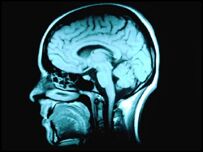Scan 'shows if people trust you'
Excerpt from BBC News, 4/2005
 US
scientists say they can tell whether one person trusts another, by using
a brain scan. The results suggest that a brain region called the caudate
nucleus lights up when it receives or computes data to make decisions
based on trust.
US
scientists say they can tell whether one person trusts another, by using
a brain scan. The results suggest that a brain region called the caudate
nucleus lights up when it receives or computes data to make decisions
based on trust.
The Baylor College of Medicine team based their findings on magnetic resonance imaging (MRI) brain scans of volunteers playing a money game. During the money game, one player, designated the "investor", received $20. They then had the option of sending some, all, or none of the $20 to the other player, the "trustee". According to the rules of the game, which were known by both players, whatever money the trustee was given would triple. The trustee then had the option of returning a portion of the new sum to the investor.
The study authors looked at what happened in the brains of both players during 10 rounds of the game. They found the extent to which the players trusted each other with their money depended on the recent history of the exchange.
Activity in the caudate nucleus was greatest when the investor repaid generosity with generosity and most subdued when the investor repaid generosity with stinginess. According to the researchers, this suggested that the caudate nucleus receives or computes information about both the fairness of a social partner's decision and the intention to repay that decision with trust.
As the game went on, brain scan signs of the trustee's intention to "trust" or "not to trust" revealed whether they were going to increase their investment or not.
Past studies have shown the caudate nucleus is connected to the brain's reward pathways and that it goes into overdrive when a reward is expected. Lead researcher Dr. Read Montague said the latest findings might be important for understanding more general, everyday judgments of trust. He said it could help in cases where people "have an incapacity to model others or be sensitive to others”.
His team is also investigating whether trust differs across nationalities, comparing German volunteers with volunteers from China.
Professor Lyn Pilowsky, professor of neurochemical imaging and psychiatry at London's Institute of Psychiatry, UK, said that because of the complex function of the caudate nucleus it was difficult to tell whether it was also the centre for trust. This was because it is involved with ranking the order and priority of information as well as judging rewards. "The caudate nucleus would be generally important in this type of money game anyway because of its many functions. It's not specific. It would be important to devise a test that would test only trust. It offers us a window into these very complex social interactions but whether it tells us something specific I do not know. It might be good to look back at people who had lost function of their caudate nucleus through a stroke, for example, and see whether they had particularly lost their sense of trust."
The research is published in the latest edition of Science magazine.
news.bbc.co.uk/go/pr/fr/-/hi/health/4397269.stm